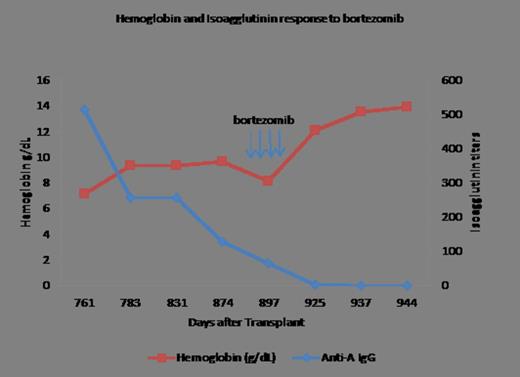Pure red cell aplasia (PRCA) is an uncommon complication of ABO-incompatible hematopoietic stem cell transplantation. It is characterized by anemia, reticulocytopenia and absence of erythroid precursors in a morphologically normal-appearing bone marrow. Most cases of PRCA resolve spontaneously within weeks to months. A small subset of patients has a protracted disease course requiring continued red blood cell (RBC) transfusions. There is no approved standard of care for PRCA. Tapering of immunosuppressives such as steroids and calcineurin inhibitors, plasma exchange, rituximab, and anti-thymocyte globulin have all been employed with varying success rates. We report a case of PRCA after ABO-incompatible transplant that responded remarkably to treatment with bortezomib.
A 60 year old female received a non-myeloablative HLA-matched ABO-mismatched sibling donor transplant for lenalidomide-refractory myelodysplastic syndrome (5q-). She received fludarabine/busulfan conditioning and tacrolimus/methotrexate for GVHD prophylaxis. The donor was blood type A Rh-positive and the recipient was O Rh-positive. The patient's post-transplant course was complicated by delayed engraftment, thrombocytopenia and autoimmune hemolytic anemia. When seen at our institution 22 months post-transplant, she had transfusion-dependent anemia requiring RBC transfusions every 2-3 weeks and reticulocytopenia. Bone marrow biopsy showed erythroid aplasia and preserved hematopoiesis in other cell lines, dysplasia was absent and parvovirus testing was negative. The patient had evidence of complete engraftment based on short tandem repeat analysis. Blood typing reflected transfused type O Rh-negative RBCs. Neither A cells from the donor nor Rh-positive cells from the patient were detected. High titers of anti-A and anti-B isohemagglutinins were detected despite transfusion with washed RBCs to reduce passive transfer. She was treated with prednisone 60mg/day, rituximab 375 mg/m2 weekly x4 and methylprednisolone 1g weekly x6 without response. Eventually, all immunosuppressive medications were discontinued to induce a graft versus recipient response. Two subsequent bone marrow biopsies continued to show nearly absent erythropoiesis, and the rare erythroid cells present lacked the blood group A antigen. Since PRCA was thought to be due to the recipient's plasma cells making anti-A antibodies, bortezomib, a potent inducer of apoptosis in plasma cells, was initiated. Subcutaneous bortezomib 1.3 mg/m2 was administered weekly x4. The patient responded well to therapy. A month after completion of bortezomib, the patient's hemoglobin measured 12.1 g/dL, reticulocyte count was 174 x109/L and IgM and IgG anti-A titers were both < 1. Bone marrow biopsy showed relative erythroid hyperplasia, and the majority of the erythroid precursors expressed blood group A. The patient continues to do well and at the time of her most recent evaluation, her hemoglobin was 13.9 g/dL. She has also remained transfusion-independent.
PRCA after major ABO-incompatible transplant is thought to be caused by persistence of recipient plasma cells that continue to secrete anti-donor isohemagglutinins. Antibody titers may remain elevated for a longer duration in patients receiving non-myeloablative preparatory regimens. Bortezomib is a proteasome inhibitor that selectively induces apoptosis in plasma cells. Bortezomib has been used successfully to treat anti-body mediated rejection in both renal and liver transplant patients. A case of PRCA following ABO-mismatched hematopoietic transplant that was successfully treated with IV bortezomib has also been reported. To our knowledge, this is the first reported case of isohemagglutinin-mediated PRCA after ABO-mismatched transplant that responded favorably to subcutaneous bortezomib.
The lack of long-term follow-up data precludes any assessment about the durability and persistence of response to bortezomib.
Bortezomib is an effective treatment for patients with PRCA mediated by residual host isohemeagglutinins after ABO-incompatible hematopoietic transplantation.
Off Label Use: Our presentation describes the use of bortezomib for treatment of pure red cell aplasia after ABO-incompatible hematopoeitic stem cell transplantation. Vercellotti:Sangart Inc.: Research Funding; Seattle Genetics, Inc.: Research Funding.
Author notes
Asterisk with author names denotes non-ASH members.


This feature is available to Subscribers Only
Sign In or Create an Account Close Modal